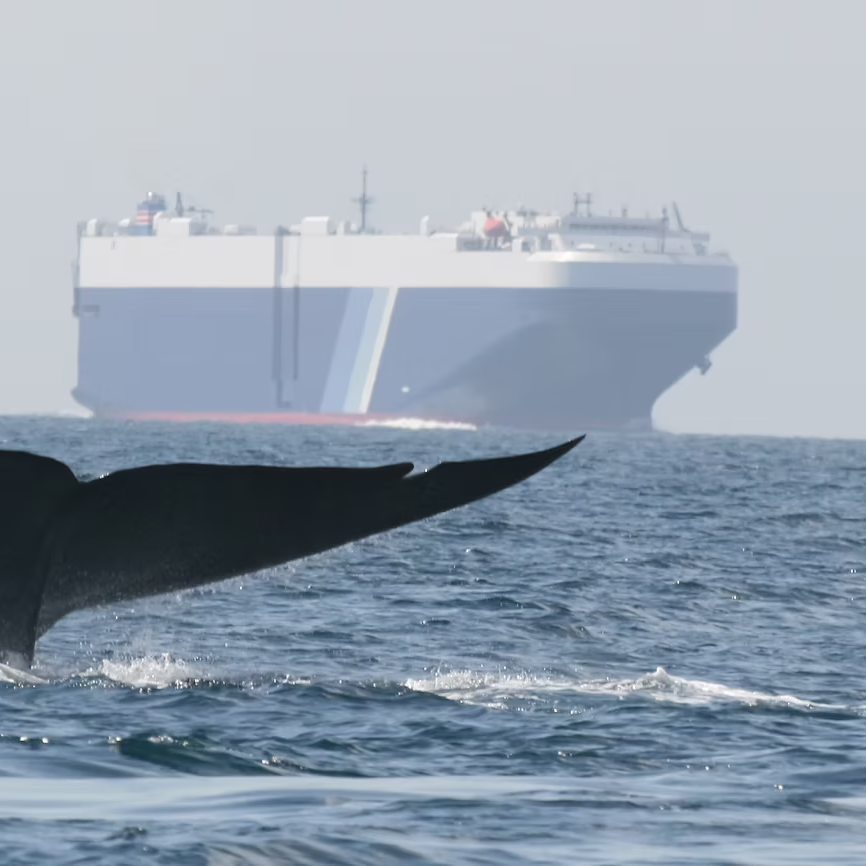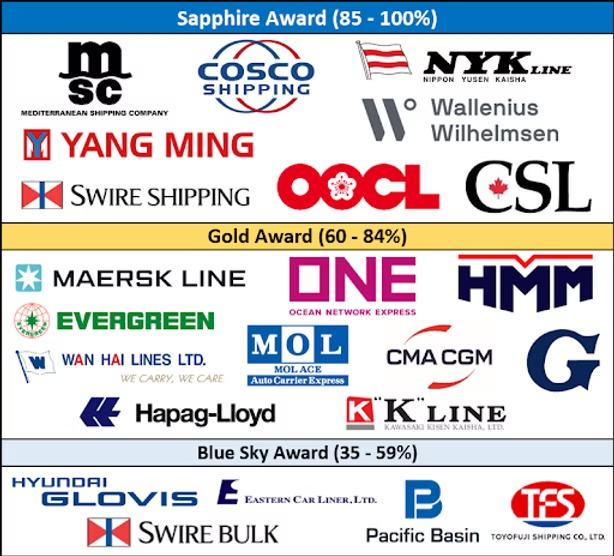
Global shipping companies recognized for reducing speeds off California coast to protect blue whales and blue skies
Program continues to expand and achieve greater environmental benefits
Share
Twenty three shipping companies participated in Protecting Blue Whales & Blue Skies vessel speed reduction program in 2022, contributing to cleaner air, safer whales, and a quieter ocean. Companies are recognized for their vessels transiting at ten knots or less in the San Francisco Bay Area and the Southern California region. The program’s Southern California region extends from Point Arguello (in Santa Barbara County) to waters near Port Hueneme and Dana Point (by the Ports of Los Angeles and Long Beach).
The voluntary incentive program ran May 1, 2022 through December 15, 2022. Participation was greater than any previous year, and increased from eighteen shipping companies participating in 2021.
Shipping companies received recognition and financial awards based on the percent of distance traveled by their vessels through the Vessel Speed Reduction (VSR) zones at 10 knots or less and with an average speed of 12 knots or less.
The three award tiers are Sapphire (85-100% of fleet total distance in VSR zones traveled at ten knots or less), Gold (60-84%), and Blue Sky (35-59%). Automatic Identification System (AIS) transponders on each ship transmit the ship’s speed and location. AIS data was analyzed for each fleet and the company’s performance was classified by tier. Companies that performed at the Gold or Sapphire level were offered a financial incentive.
Eight participating companies reached the Sapphire level, the most in the top category since the program began. They include Orient Overseas Container Line (OOCL), Mediterranean Shipping Company (MSC), Swire Shipping, Yang Ming, COSCO Shipping, NYK Ro-Ro, Wallenius Wilhelmsen, and CSL Group.

For the fifth year in a row, Mediterranean Shipping Company (MSC) notably achieved the Sapphire tier in the large fleet category and demonstrated that advance planning enables ships to adjust their schedule to cooperate with the VSR program without disrupting operations. Orient Overseas Shipping Line, a new participant in the program, notably achieved a 95% cooperation level in 2022, reducing speeds to 10 knots or less for over 15,000 miles in the California zones.
Two blue whales in Channel Islands National Marine Sanctuary_NOAA.jpg
The ten-knot target complements the National Oceanic and Atmospheric Administration (NOAA), U.S. Coast Guard, and Environmental Protection Agency requests for all vessels (300 gross tons or larger) to reduce speeds during the months of peak air pollution and endangered blue, humpback, and fin whale abundance to protect these whales from ship strikes.
Ship strikes are a major threat to whales globally and to the recovery of endangered blue, fin, and humpback whales in California waters. Reducing the risk of ship strikes is a major priority of NOAA’s, including NOAA’s West Coast national marine sanctuaries. Observed and documented deaths totaled 52 endangered whales from 2007-2022, and likely represent only a small fraction of the total number of ship strikes taking place annually.
The timing of the program also coincides with the season when ground-level ozone (smog) concentrations are typically high. The 10-knot target allows ships to travel at an efficient operating load using less fuel and producing less pollution. Ocean-going vessels transiting the California coast generate nitrogen oxides (NOx, a precursor to smog), sulfur oxides (SOx), particle pollution, and greenhouse gasses (GHGs). These vessels account for nearly 200 tons of NOx per day emitted off the coast of California, which affects ozone levels onshore in many regions of the state. The areas of greater Los Angeles (including Ventura County), Santa Barbara County, and the San Francisco Bay do not meet the state and/or federal air quality standards for ozone.
The VSR incentive program has expanded in scope and environmental benefits each year, including 2022, which marked the seventh year. Highlights of the 2022 program include:
Of the 344,000 nautical miles of ocean transited by all the ships in the program, nearly 270,000 nautical miles were at 10 knots or less, which is equivalent to traversing the circumference of the Earth more than ten times.
Ships in the program transiting the southern California approximately 200-nautical-mile VSR zone traveled at 10 knots or less for 79% of the total miles traveled. Cooperation has steadily increased season after season, (in 2017, approximately 21% of the miles were traveled at 10 knots or less). This shows the increasing commitment by the participating companies over the years.
In the approximately 100-nautical-mile San Francisco Bay Area VSR zone – which was expanded in 2022, cooperation levels from the participating companies rose to 72%, up from 60% in 2021.
Shipping companies that participated in the 2022 program reduced their air pollutant emissions by approximately 920 tons of NOx and 32,000 metric tons of regional GHGs. These numbers represent a 27% reduction in NOx and GHG pollution from the ships that participated in the program, as compared to baseline conditions. For comparison, the NOx reductions are equivalent to converting 580,000 passenger vehicles to zero emissions for a single year.
The transits of vessels participating in the VSR program posed approximately 44% less strike mortality risk to whales than if those vessels did not slow in cooperation with the program.
Ships in the Sapphire, Gold, and Blue Sky award tiers had sound levels that were 4.6 dB per transit lower when compared to 2021 baseline source levels. With a reduction in noise pollution, whales can likely communicate easier.
Incentives ranged from $2,500 to $20,000 per company in the Gold and Sapphire award tiers.
Fourteen companies – Orient Overseas Shipping Line (OOCL), Mediterranean Shipping Company (MSC), COSCO Shipping Line, CSL Group, Ocean Network Express (ONE), Maersk, “K” Line, Wallenius Wilhelmsen, Wan Hai, Evergreen Shipping, Swire Shipping, Hapag Lloyd, GALI, and Yang Ming – generously declined all or part of their financial incentive payments. Those funds will be used for additional public recognition efforts and reinvested in the program.
The 2023 program runs May 1 through December 15, 2023. This will be the biggest season yet for whale protection and clean air, with tanker operators invited to join. Expansion of the San Francisco VSR zone will extend the area by approximately 130 miles to include all of Monterey Bay National Marine Sanctuary. With this expansion, three new partners are joining the 2023 program: Monterey Bay National Marine Sanctuary, the Monterey Bay Air Resources District, and San Luis Obispo County Air Pollution Control District. The 2023 program will not feature financial incentives, due to participants’ feedback in support of the vessel speed reduction effort and public recognition.
The program is a collaborative effort by Ventura County Air Pollution Control District; Santa Barbara County Air Pollution Control District; San Luis Obispo County Air Pollution Control District; Monterey Bay Air Resources District; Bay Area Air Quality Management District; Channel Islands, Greater Farallones, Cordell Bank, and Monterey Bay national marine sanctuaries; The Volgenau Foundation; California Marine Sanctuary Foundation; National Marine Sanctuary Foundation; Greater Farallones Association; Environmental Defense Center; Point Blue Conservation Science; Starcrest Consulting; and Scripps Whale Acoustic Laboratory/Scripps Institution of Oceanography.
For more information, visit www.bluewhalesblueskies.org.
Copy of Blue Whales Blue Skies logo.png
Program partners comment on Protecting Blue Whales and Blue Skies:
Santa Barbara County Air Pollution Control District, Aeron Arlin Genet, Air Pollution Control Officer: “We applaud the participating shipping companies, many of which have returned to this program year after year. Their voluntary efforts to reduce speeds have again translated to significant benefits for air quality and endangered whales. This program continues to show what great things can happen when local, state, national, and international organizations collaborate.”
Ventura County Air Pollution Control District, Ali R. Ghasemi, Air Pollution Control Officer: “Ocean-going vessels contribute over 40 percent of the nitrogen oxides emitted in Ventura County and the associated outer continental shelf area. The program expansion to include bulk and general cargo ships will help us address a larger share of these emissions in a voluntary manner. I greatly appreciate those participating companies that decline their financial incentives so the program can continue with the limited resources available.”
Bay Area Air Quality Management District, Dr. Philip Fine, Executive Officer:
“The Blue Whales and Blue Skies program protects our air quality and climate through slower vessel speeds that reduce air pollution and greenhouse gasses. This program is a smart partnership that protects endangered whales while delivering cleaner air for Californians.”
Channel Islands National Marine Sanctuary, Chris Mobley, Superintendent:
“The National Marine Sanctuaries Act guides us to create models of, and incentives for, ways to conserve and manage, including innovative management techniques. This innovative incentive-based vessel speed reduction program, in collaboration with county air management districts, the shipping industry, other agencies, and NGOs, serves as a model for enhancing ocean and human health while promoting a sustainable, blue economy.”
Greater Farallones and Cordell Bank National Marine Sanctuaries, Maria Brown, Superintendent:
“The survival of these endangered whales is up to all of us. The success of this program hinges on the shipping industry’s willingness to advance whale conservation and promote cleaner air, while conducting commerce, in partnership with agencies and nonprofits. By working together, we can ensure blue, fin, and humpback whales continue to live on this planet.”
The Environmental Defense Center, Kristen Hislop, Marine Conservation Program Director:
“What started as an innovative pilot project that brought together environmental groups, the shipping industry, as well as federal and local governments in an effort to protect endangered whales and improve air quality has proven incredibly effective at accomplishing both goals. The Environmental Defense Center will continue our work to ensure these efforts are rewarded by legislation that would provide this vital program with the resources it needs to thrive long into the future.”
The Volgenau Foundation, Lisa Volgenau, Vice President and Board Director:
“We are proud to be a part of this partnership that helps improve air quality and protect marine species, particularly endangered whales. Each year, the increasing participation of shipping companies contributes to the goal of a sustainable outcome. We especially commend those companies that declined their incentives, which truly shows their support of conservation along the coast. We hope that many more will follow their commitment to significantly improve ocean and human health for future generations.”
California Marine Sanctuary Foundation, Robert Mazurek, Executive Director:
“It is very exciting to be part of a project where everyone can see such clear benefits. This is a win for clean air, a win for endangered and threatened whales, and a win for our collaborative effort, where government, industry, philanthropists, and nonprofits understand that it takes all of us to achieve significant conservation success.”